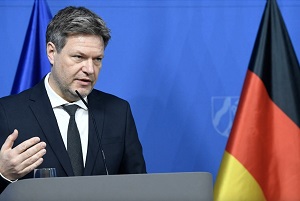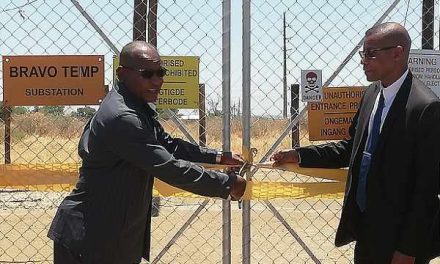
Germany’s Vice Chancellor visits Namibia to establish closer energy ties

Germany’s Vice Chancellor H.E Robert Habeck this week embarked on a five-day tour to Namibia and South Africa in search of hydrogen to ensure energy security in Europe’s largest economy.
Habeck, the German Economy Minister, arrived in Namibia on Monday as the European country seeks to replace Russian gas with alternative energy resources.
The trip to Namibia and South Africa follows Habeck’s recent visit to Qatar – where the Minister signed a 15-year liquefied natural gas (LNG) purchase and supply contract with Qatar Energy, the African Energy Chamber (AEC) said on Monday.
So-called green hydrogen, produced using renewable electricity, is seen as a key power source that can reduce pollution from long-haul heavy transport, steel and chemical industries, and power generation.
According to the AEC, the vast natural gas resources which remain untapped across the southern African region present massive energy security and economic growth opportunities and win-win scenarios for Germany and the southern-African countries involved.
“The AEC believes that the two countries rapidly expanding gas industry – on the back of recent giant discoveries including TotalEnergies’ Luiperd and Brulpadda discoveries in South Africa and Namibia’s Venus and Graff discoveries, and the tremendous hydrocarbon potential in the Namib basin – presents a quick and sustainable solution to address Germany’s current energy crisis,” the AEC said in a statement.
The Executive Chairman of the AEC, NJ Ayuk, said Germany is seeking energy security and wants to decarbonize, while South Africa and Namibia want to industrialize. He added that the trillions of natural gas reserves both on- and offshore across southern Africa will be crucial in driving long-term socioeconomic developments for the three parties.
“As the Chamber, we are confident gas presents the best energy resource Germans can seek from Africa to address their energy woes without further delays,” said Ayuk.
“Eni’s Coral Sul Floating LNG project in Mozambique – which made its first LNG shipment to Europe in mid-November – is the perfect example of the potential of leveraging Africa’s offshore gas to ensure energy reliability in Europe.
The AEC strongly urges Germany to maximize investments in Namibia and South Africa’s LNG production and export potential to address its looming gas shortages,” continued the AEC, adding that with Namibia and South Africa prioritizing gas exploitation and reserve expansion to meet electrification targets – and Germany increasing coal dependence to meet demand – Germany’s investments in gas exploration in the high-prospects deep water and ultra-deepwater basins of southern Africa could play a crucial role in driving a just energy transition in Europe and Africa.











































